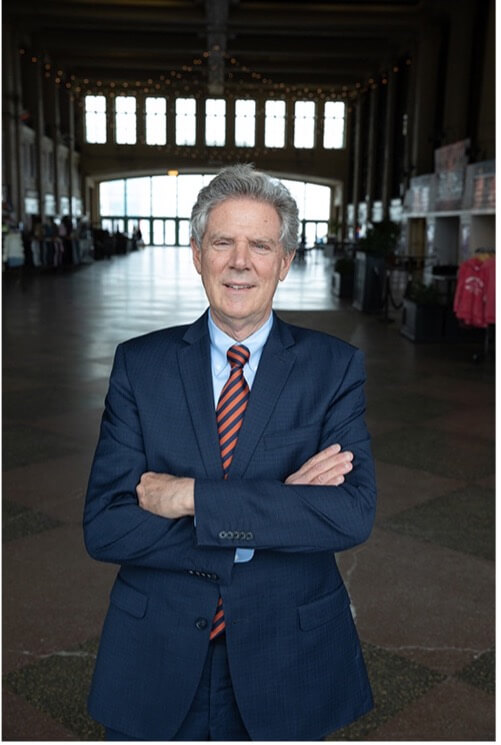By Emily O’Sullivan
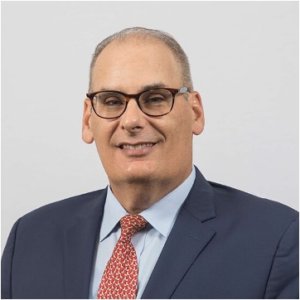 On March 25, 2021, Monmouth University’s Institute for Global Understanding (IGU) launched its three-day biennial symposium, inviting attendees from around the world to join experts in exploring a central theme: human rights and the environment. Though the IGU had orchestrated several symposia during its initial period of existence, this event marked the relaunched IGU’s first major event since the institute’s hiatus from 2015-2020. Soon after Prof. Randall Abate was appointed Director of the relaunched IGU in March 2020, Abate and his colleagues on the IGU Faculty Advisory Council devoted nearly a year to prepare for the forum, enlisting the help of multiple student assistants and interns along the way. Though the COVID-19 pandemic’s realities forced the symposium to pivot from its usual in-person format, the use of an online platform made for a truly global experience, connecting speakers and participants from across the globe and allowing the IGU to exert its greatest possible impact in its first year back on campus.
On March 25, 2021, Monmouth University’s Institute for Global Understanding (IGU) launched its three-day biennial symposium, inviting attendees from around the world to join experts in exploring a central theme: human rights and the environment. Though the IGU had orchestrated several symposia during its initial period of existence, this event marked the relaunched IGU’s first major event since the institute’s hiatus from 2015-2020. Soon after Prof. Randall Abate was appointed Director of the relaunched IGU in March 2020, Abate and his colleagues on the IGU Faculty Advisory Council devoted nearly a year to prepare for the forum, enlisting the help of multiple student assistants and interns along the way. Though the COVID-19 pandemic’s realities forced the symposium to pivot from its usual in-person format, the use of an online platform made for a truly global experience, connecting speakers and participants from across the globe and allowing the IGU to exert its greatest possible impact in its first year back on campus.
Following a warm welcome from Monmouth University President Dr. Patrick F. Leahy, Congressman Frank Pallone, Jr.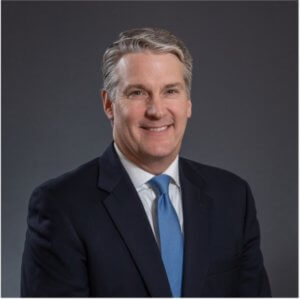 addressed the virtual crowd. Born in Long Branch, Congressman Pallone has firsthand experience with the Monmouth community. He has served in the U.S. House of Representatives since 1988 and currently represents New Jersey’s 6th congressional district, a position in which he fights for many issues that are integral to the IGU’s mission. Specifically, he is a fierce environmental justice advocate, combating the climate crisis in his role as the Chairman of the House Energy and Commerce Committee and working to maintain the ecological integrity of coastal New Jersey communities.
addressed the virtual crowd. Born in Long Branch, Congressman Pallone has firsthand experience with the Monmouth community. He has served in the U.S. House of Representatives since 1988 and currently represents New Jersey’s 6th congressional district, a position in which he fights for many issues that are integral to the IGU’s mission. Specifically, he is a fierce environmental justice advocate, combating the climate crisis in his role as the Chairman of the House Energy and Commerce Committee and working to maintain the ecological integrity of coastal New Jersey communities.
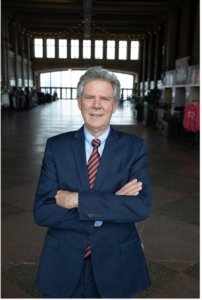 In relation to this passion, he happily reported that the United States has become “re-engaged” in the battle against climate change, with President Biden rejoining the Paris Agreement during his first days in office and reinstating important relationships with international allies. Given the urgency regarding climate action, such measures are paramount. Congressman Pallone remarked that New Jersey residents in particular experience the consequences of inaction, hearkening back to the devastation of Hurricane Sandy in 2012 and the years it took to rebuild what had been destroyed. With this in mind, he stressed the importance of service at both the local and global levels, and he praised the university for its commitment to “international affairs and global understanding” and to “the local community and so many things involving the Jersey Shore.” The IGU similarly values local-global connections, and it strives to promote an environmentally just future alongside key leaders in the movement like Congressman Pallone.
In relation to this passion, he happily reported that the United States has become “re-engaged” in the battle against climate change, with President Biden rejoining the Paris Agreement during his first days in office and reinstating important relationships with international allies. Given the urgency regarding climate action, such measures are paramount. Congressman Pallone remarked that New Jersey residents in particular experience the consequences of inaction, hearkening back to the devastation of Hurricane Sandy in 2012 and the years it took to rebuild what had been destroyed. With this in mind, he stressed the importance of service at both the local and global levels, and he praised the university for its commitment to “international affairs and global understanding” and to “the local community and so many things involving the Jersey Shore.” The IGU similarly values local-global connections, and it strives to promote an environmentally just future alongside key leaders in the movement like Congressman Pallone.
As the founder and inaugural director of the IGU, Dr. Rekha Datta first instilled this 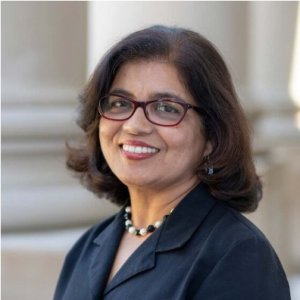 principle into the institute’s mission. Through her current posts as Monmouth’s Interim Provost and Vice President for Academic Affairs, Dr. Datta works toward this vision on a university-wide scale. Speaking after Congressman Pallone, she provided a bit of insight into the IGU’s history, explaining that “a small group of faculty and staff getting together in the student center in June of 2001 and just wondering what we could do to promote more global and cultural literacy on this campus” spearheaded the IGU’s creation. Guided by Margaret Mead’s philosophy, “Never doubt that a small group of thoughtful, committed citizens can change the world; indeed, it’s the only thing that ever has,” the IGU was born. Functioning as a space of faculty and student engagement throughout its 20-year history, the IGU has long envisioned a world that understands the connection between human rights and the environment as significant to every living being, and the re-launched IGU now hopes to build on Dr. Datta and her colleagues’ legacy.
principle into the institute’s mission. Through her current posts as Monmouth’s Interim Provost and Vice President for Academic Affairs, Dr. Datta works toward this vision on a university-wide scale. Speaking after Congressman Pallone, she provided a bit of insight into the IGU’s history, explaining that “a small group of faculty and staff getting together in the student center in June of 2001 and just wondering what we could do to promote more global and cultural literacy on this campus” spearheaded the IGU’s creation. Guided by Margaret Mead’s philosophy, “Never doubt that a small group of thoughtful, committed citizens can change the world; indeed, it’s the only thing that ever has,” the IGU was born. Functioning as a space of faculty and student engagement throughout its 20-year history, the IGU has long envisioned a world that understands the connection between human rights and the environment as significant to every living being, and the re-launched IGU now hopes to build on Dr. Datta and her colleagues’ legacy.
As a step toward this goal, Director Abate secured Professor Maxine Burkett to deliver the symposium’s Distinguished Lecture, titled “Root and Branch: Climate Migration, Racial Crises, and the Future of Climate Justice.” Hailing from the University of Hawaii’s William Richardson School of Law, Professor Burkett is a world-renowned legal scholar known for her work on climate migration and on climate justice inside and outside academic contexts. In addition to her role as an educator, she currently serves as the Co-founder and Director of the Institute for Climate and Peace, a position that highlights her skills as “a leader in the intersectionality of climate change as an issue that is fundamentally at the corner of human rights and the environment.” Professor Burkett’s scholarship focused on these issues long before they entered mainstream dialogue, which is why Director Abate referred to her as a “pioneer” in the environmental justice movement and honored her longstanding efforts toward a better future for all.
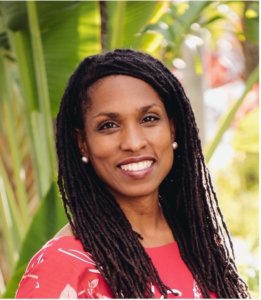 Professor Burkett began her talk by establishing the linkages among racism, racial hierarchy, environmental degradation, and the law, deeming contemporary climate change “the climax of centuries of wrong relationships with our natural environment.” She then proceeded to discuss climate migration within our constructed geopolitical landscape, explaining that man-made borders exacerbate the conditions of climate-driven movement and perpetuate “racialized exclusion.” Before diving further into her discussion, she defined common terms in the climate mobility lexicon, differentiating between climate displacement and climate migration on the basis that the latter implies a degree of voluntary movement while the former results from short-term force. On a similar note, a key understanding of climate migration is that the most vulnerable — the poor — often lack the resources to emigrate from their established communities, creating a problem of “trapped populations.” Moreover, climate migrants cannot turn to any legitimate source of recourse, for no single governance entity is required to respond to their troubles. Consequently, Professor Burkett moved onto an analysis of reparations, citing various scholars who hold that countries that have historically contributed to the climate change crisis should assume responsibility for mitigating the challenges that accompany today’s climate migration. She also noted that the most substantive reparation is one committed to the principle of “non-repetition,” guaranteeing that future communities will not have to withstand the past’s ills.
Professor Burkett began her talk by establishing the linkages among racism, racial hierarchy, environmental degradation, and the law, deeming contemporary climate change “the climax of centuries of wrong relationships with our natural environment.” She then proceeded to discuss climate migration within our constructed geopolitical landscape, explaining that man-made borders exacerbate the conditions of climate-driven movement and perpetuate “racialized exclusion.” Before diving further into her discussion, she defined common terms in the climate mobility lexicon, differentiating between climate displacement and climate migration on the basis that the latter implies a degree of voluntary movement while the former results from short-term force. On a similar note, a key understanding of climate migration is that the most vulnerable — the poor — often lack the resources to emigrate from their established communities, creating a problem of “trapped populations.” Moreover, climate migrants cannot turn to any legitimate source of recourse, for no single governance entity is required to respond to their troubles. Consequently, Professor Burkett moved onto an analysis of reparations, citing various scholars who hold that countries that have historically contributed to the climate change crisis should assume responsibility for mitigating the challenges that accompany today’s climate migration. She also noted that the most substantive reparation is one committed to the principle of “non-repetition,” guaranteeing that future communities will not have to withstand the past’s ills.
On a related topic, Professor Burkett explored the work of Jason Hickel, a renowned anthropologist who argued, “rich countries aren’t developing poor countries: poor countries are developing rich countries, and they have been since the late 15th century.” Similarly, she explained that the leading world powers attained their status by exploiting the countries we often refer to as “developing” today, supporting her argument that countries can perhaps best help those that are struggling from environmental degradation by simply wielding “less harm” on them. In short, a global system of inequity has created the current climate landscape, and world leaders must actively reject past habits if they seek to combat the climate crisis effectively.
Importantly, Professor Burkett concluded her lecture on an optimistic note, paying homage to the many who work alongside her to catalyze an increasingly equitable future. Like Congressman Pallone, she expressed appreciation for the Biden administration’s recognition of the crisis’ urgency and its prioritization of relevant initiatives, even beyond the Paris Agreement. Ultimately, Professor Burkett encouraged the attendees to consider that people are capable of a better tomorrow — to reach one, though, they must first evaluate the roots that brought them to their current destination and learn enough from them to never make the same mistakes again. As Professor Burkett noted in her lecture, “Decision-makers have generally favored low-hanging fruit in our problem-solving yet, at the roots, we find the origins of both a dangerously cabin view of the environment and a political economy that has relied on sacrificing land and people.”
To view the opening remarks and Distinguished Lecture, please watch the recording on YouTube.

